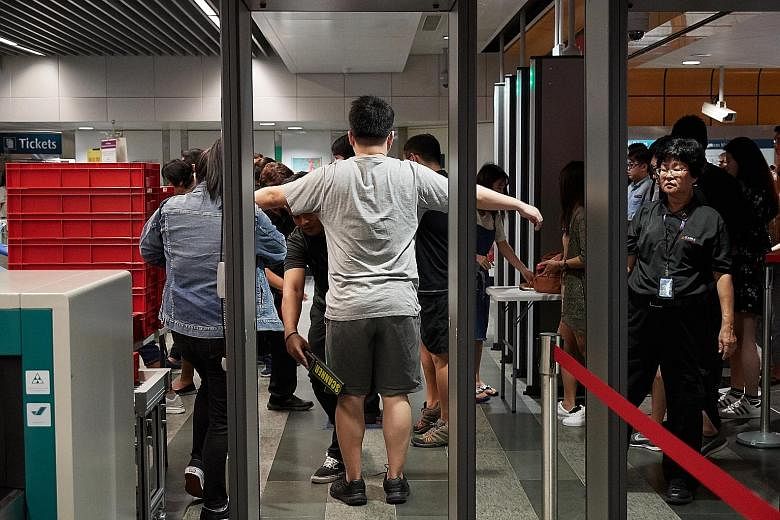MRT commuters face the prospect of airport-like security checks, with some train stations to install X-ray scanners and metal detectors in a six-month trial.
In a statement yesterday, the Land Transport Authority (LTA) said the scanners will be installed "at selected stations across all rail lines". The trial starts next Monday.
"Some commuters may be required to use a walk-through metal detector and pass their belongings through X-ray scanners, before entering the fare gates," the authority announced.
It added that screening equipment may be deployed at up to six MRT stations at any one time.
"Information obtained through the trial will enable LTA to streamline and optimise its security screening processes, and reduce the future impact on daily rail operations," LTA said.
"We will also collect feedback from commuters and public transport operators to improve the effectiveness of future security operations and emergency exercises."
LTA chief executive Ngien Hoon Ping said: "By the end of this year, public transport operators will also progressively introduce the use of handheld metal detectors in their security checks at bus interchanges and MRT stations."
LTA had previously tried out these security measures, but on a smaller scale.
In February, commuters had to go through X-ray machines and metal detectors at the Downtown Line's Newton station. The Straits Times reported that it added around eight minutes to the time it took to walk from the North-South Line to the Downtown Line at the station. But that was ona Sunday.
Commuters said they fear the screening process will make peak-period travel even more stressful than it already is.
Game designer Keith Ng, 36, said: "If it makes Singapore a safer place, I'm cool with it. But it must not be too much of an inconvenience."
Mr Ng cited the move to erect half-height platform screen doors to prevent people from falling onto the tracks. "That's not an inconvenience, but this will be."
Ms Nicole Quek, 35, said: "It'll delay everybody. But if it's for safety, there's really not much I can say."
The manager of content strategy at a broadcast firm said she hopes that the screening will be random, and will not be for every commuter.
Associate Professor Bilveer Singh at the National University of Singapore's (NUS) political science department said: "MRT and train stations are targets of choice by terrorists. I would prefer to suffer some delays rather than rush through to insecurity and, worse, damage.
"As an open society, we must change our mindsets and accept some adjustments, just as we have in airports."
He noted that it must have taken planners "some pain to do this, knowing well how heavily used our trains are".
NUS transport researcher Lee Der-Horng said longer travel time will be "inevitable", but the security consideration overrides the inconvenience. "As a passenger, I will not mind having this new security measure," he said, adding that it might even act as "a buffer to mediate the platform crowdedness".
Meanwhile, questions have been raised overseas on the effectiveness of security screening.
Three years ago, United States Homeland Security officers carried out a test to seehow effective airport screenings were. Masquerading as travellers, the officers were able to smuggle potentially dangerous weapons in67 out of 70 instances.
It was not the first time. In previous tests, the Transportation Security Administration - set up after the 9/11 terrorist attacks - had high failure rates as well.


